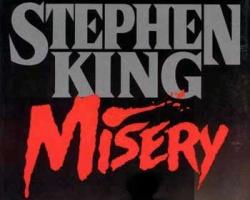Perhaps horror innately traffics in the spiritual, but with Stephen King, born in 1947, there seems to be something more. Judging by the number of speculative websites promising answers, people have become increasingly fascinated by the religious beliefs of the world’s best-selling novelist (350 million books sold).
Maybe you’ve long appreciated his spiritual preoccupations, or maybe you’ve feared all your life to pick up a Stephen King book and rightly question what our most famous witness of the macabre would ever have to say about Jesus, God or Christianity.
Consider some passages from King’s writings:
1. “Jesus watches from the wall, but his face is cold as stone. And if he loves me—as she tells me—why do I feel so alone?” (Carrie, 1976)
2. “I don’t want Church to be like all those dead pets! I don’t want Church to ever be dead. He’s my cat! He’s not God’s cat! Let God have his own cat!” (Pet Sematary, 1983)
3. “Do you know how cruel your God can be, David? How fantastically cruel?…Sometimes he makes us live.” (Desperation, 1996)
4. 4. “If it happens, God lets it happen, and when we say, ‘I don’t understand,’ God replies, ‘I don’t care.'” (The Green Mile, 1996)
Consider the works of King that turn on spiritual matters. He calls Desperation “a very Christian novel…it’s going to make some people uncomfortable, I think.” In The Green Mile, he writes a dream sequence directly linking John Coffey’s sacrifice to Jesus on the cross (a scene that was not filmed for the movie). The Stand (1978) was his effort to give God his due, “to explore what that means to be able to rise above adversity by faith, because it’s something most of us do every day.” And that’s only the beginning of a much longer list of spiritual questions in King’s writings.
A critical consensus of his body of work highlights his belief in the super- natural or unnatural invading regular lives, a focus on the traditionally marginalized in society, and a preoccupation with the anxieties and challenges of adolescence. Reviewers agree that he has insightfully captured and recorded the fears, anxieties, and obsessions of the late twentieth and early 21st century. Does any of that make Stephen King a Christian?
It’s a question King might appreciate, because his work has questioned Christianity all along. His website says he was raised in a Methodist church and grilled on doctrine. He still reads his Bible. In interviews, he’s professed a belief in God but says he has “no use for organized religion.” He calls the idea of God a mystery but makes it clear, “I don’t see myself as God’s stenographer.”
Besides, he likes the idea of questions more than answers. He wants to make readers question. “If you have a real problem then I’m doing what a novel of suspense and horror is supposed to do, which is to just scratch below the surface and sort of rub your nerves the wrong way,” he says.
Is Stephen King a Christian? In portraying the religious teachings of his childhood and confronting a suspenseful, horror-filled world where God often seems absent and cruel and the behavior of his followers puzzling if not downright evil, what if Stephen King is asking the same of us?
Is he affirming or decrying the Old Testament God in the prophetic rants of Mrs. Carmody in The Mist (1980)? Is he echoing or mocking Jesus in the death of John Coffey (The Green Mile) or the escape of Andy Richter (Rita Hayworth and Shawshank Redemption, 1982)? What kind of Jesus does Jim Rennie follow in Under the Dome (2009)? Is God as cruel as Desperation (1996) and The Stand argue? Does God really rain hardship (Storm of the Century, 1999) on us because we “piss him off”? Is there a “first cause” running things?
Does it matter if Stephen King’s a Christian? Is it enough that he has filled more than two dozen novels with questions concerning the nature of God, the teachings of Christ, and the behaviors of those who follow him? Or that his six short-story collections have awakened several generations to the power and reality of the supernatural? Or that his movies and television miniseries have given viewers a scare, some hope, and a decent cry?
His body of work prompts us to ask about his beliefs. “Is Stephen King a Christian?” we collectively chime, only to find he’s turned the question on us. “Are you?” And more chillingly, “Does it matter?”




